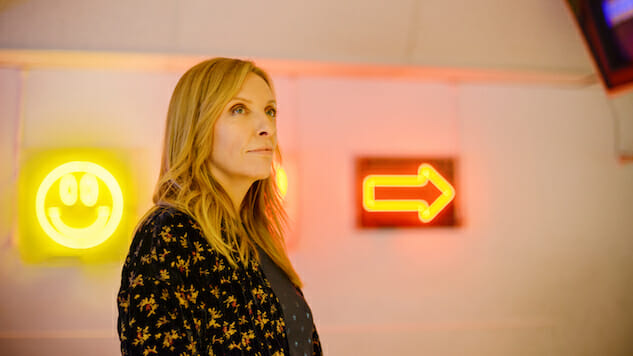Catch Toni Collette’s Next Great Performance in Netflix’s Open Marriage Dramedy, Wanderlust
Photo: Amanda Searle/Netflix
There’s nothing like the catalytic trauma of being hit by a car to make you reevaluate your body and what it’s worth to you. When Joy Richards (Toni Collette) has a cycling accident, a chain reaction of sex follows. Not all at once. Nothing Caligulan. But it invites opportunities to look elsewhere, try new things, and react when those things bounce back. It’s like how holidays precipitate breakups because you’re painfully aware of how good you should be feeling. When physical therapy starts, you’re made acutely aware of your body’s imperfection and dissatisfaction.
And in Wanderlust, it’s a family affair—if you’ll pardon the pun. Joy’s husband, Alan (Steven Mackintosh), and their kids, Tom (Joe Hurst), Naomi (Emma D’Arcy), and Laura (Celeste Dring), are all worrying around in relationships that are often funny, but more often intimate, deliberate, and brutal.
Everyone’s failing to fuck, and it’s heartbreaking. Then, everyone starts fucking and there are more complicated stakes—such the central couple discovering the joy of an open marriage, or at least trying it out. It’d be a disaster if the series acted like the idea was reinventing the wheel, as if monogamy hadn’t been a sputtering flame for some people since, well, monogamy, so it’s nice that it tries a different tack. Opening a relationship isn’t new, but it’s certainly novel and scary to these monotone Brits. Add some dryly hilarious mixed metaphors and this is one of the more amusing conversations about sexual frustration (and its roots) on TV, thanks in no small part to Collette and Mackintosh pulling double duty as people both bloodied and liberated.
Wanderlust, with subtle precision, captures the cringeworthy honesty of Girls, except that series’ stunted, immature navel-gazing has been replaced by the grown-up deadpan of Catastrophe. It’s not as inventive and insane as the former, nor as delightfully mundane as the latter, splitting the difference with mostly familiar situations that are sometimes handled with originality. But it’s sharp, sharp, sharp. It’s willing to have frank (if roundabout) conversations, written so naturally that they may cause stress dreams. That’s because writer/creator Nick Payne is a master at that distinctly British ability to ramble on and say very little while still conveying quite a bit.
Building out the conversational ecosystem of the characters and their world nourishes this stifled culture beyond two or three characters. Therapists have therapists and the relationships of side characters stack into a beautifully messy undergrowth, thanks in part to breakout turns by Hurst (that stammering little muffin), D’Arcy (emotive and subtle), and Royce Pierreson (so effortlessly charming as to seem lazy). Enough seeds are planted to keep me invested for the duration while the flora already blooming is riveting enough to keep me locked, David Attenborough-like, to the proceedings, however dull they may seem on the surface. It’s quite British, did that come across?